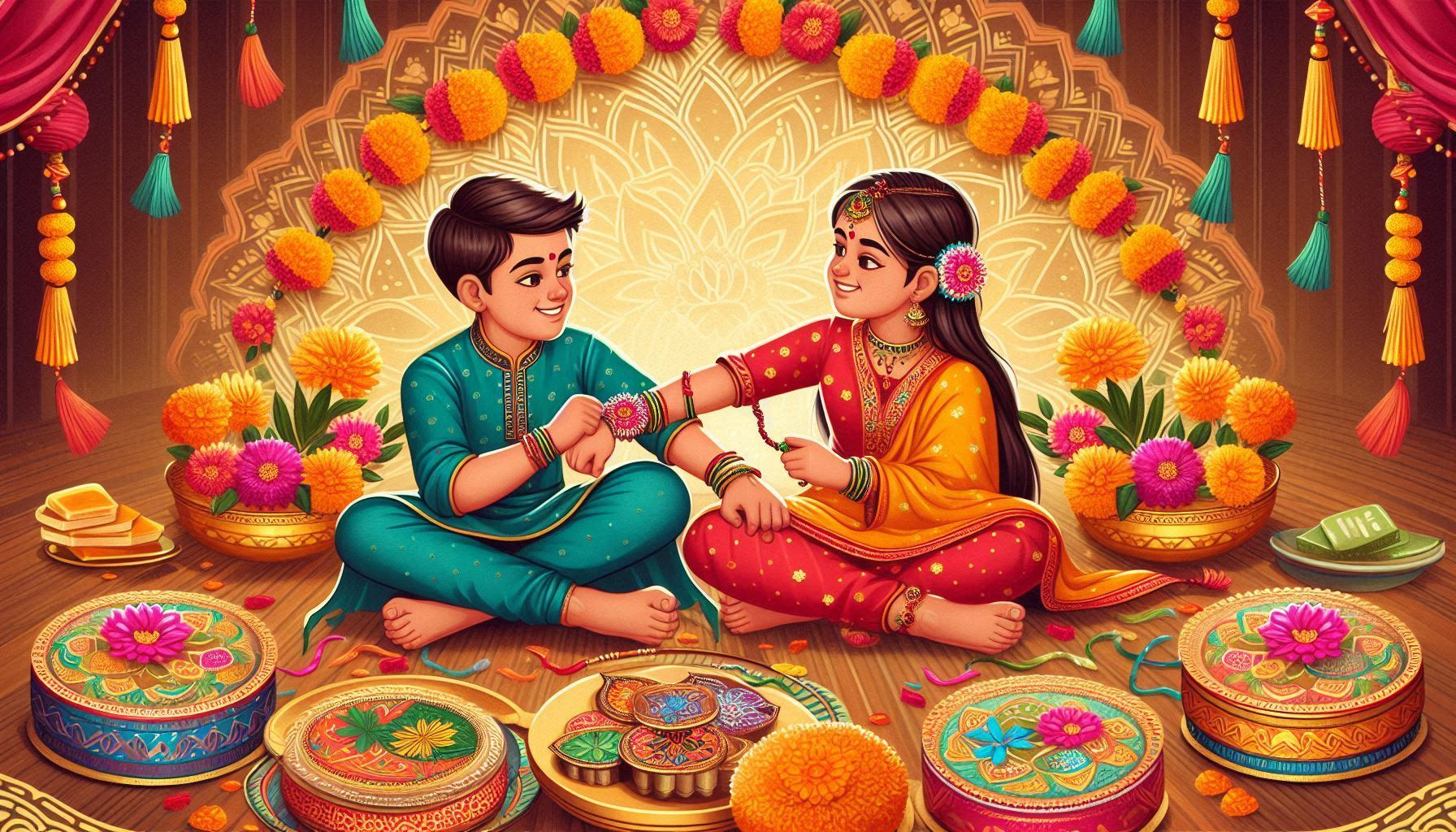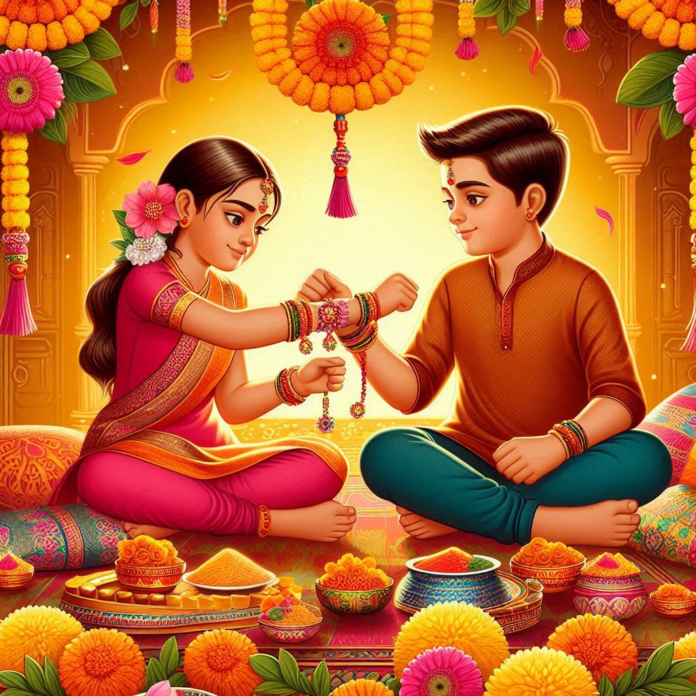Introduction
As the name suggest, Raksha Bandhan known as Rakhi is one of the most favourite festival of India which is devoted to the bonding of brothers and sisters. Celebrated on the full moon day of the Hindu lunar month of Shravana, the festival occurs in August. This occasion is a secular one and perhaps one of the oldest since it has to do with love and protection of ones closest relatives that are normally extended to the nuclear family. The term ‘Raksha Bandhan’ precisely means ‘the shield of brother-sister relationship’, to emphasise the fact that brothers and sisters have to protect each other no matter what.
This analysis delves into the origins, significance, cultural practices, modern-day adaptations, and the socio-economic impact of Raksha Bandhan, while also exploring its representation in contemporary media and its role in promoting values of unity and harmony.

Historical Origins and Mythological Significance
The origins of Raksha Bandhan can be traced back to various historical and mythological accounts, each highlighting the festival’s underlying theme of protection and love.
Mythological Accounts:
- Indra and Indrani: One of the earliest references to Raksha Bandhan is found in the ancient Hindu scriptures, where it is mentioned that during a war between the gods and demons, Indrani, the wife of Lord Indra, tied a sacred thread around Indra’s wrist, granting him protection and victory. This tale emphasizes the protective nature of the bond symbolized by Raksha Bandhan.
- Krishna and Draupadi: Another popular legend is that of Lord Krishna and Draupadi. According to the Mahabharata, when Krishna injured his finger, Draupadi tore a piece of her sari to bandage it. Touched by this gesture, Krishna vowed to protect her, which he later did during the infamous disrobing incident in the Kaurava court.
- Rani Karnavati and Emperor Humayun: A historical anecdote often associated with Raksha Bandhan is that of Rani Karnavati of Mewar and the Mughal Emperor Humayun. When attacked by the Adil Shah, the Rani of Chittor Karnavati asked for Humayun’s help and sent him a rakhi. Although he arrived too late to save her kingdom, the story highlights the powerful symbolic appeal of the rakhi, transcending religious and cultural divides.
Cultural Evolution:
- Raksha Bandhan – the bond of protection has transformed with time and incorporated the respective changes in the society of India. Traditionally, it was more about the sister seeking protection and the brother pledging to offer it. However, in contemporary times, the emphasis has shifted towards mutual respect, love, and support between siblings, irrespective of gender.
Cultural Practices and Rituals
Raksha Bandhan is perhaps one of the most widely celebrated and most enjoyable festivals in India and households that are of Indian origin around the world. The rituals associated with the festival are rich in symbolism and reflect the deep-rooted cultural values of Indian society.
Rituals:
- The Tying of the Rakhi: The central ritual of Raksha Bandhan involves the sister tying a rakhi (a sacred thread) around her brother’s wrist. This act symbolizes the sister’s prayers for her brother’s well-being and the brother’s vow to protect her.
- Puja and Aarti: Before tying the rakhi, a small puja (prayer) is often conducted. Greeting each other sisters put a tilak mark on the brothers’ forehead and light a lamp indicating the start of their brothers aarti.
- Exchange of Gifts: The festival is also marked by the exchange of gifts. Brothers often present their sisters with gifts as a token of appreciation and love, and this exchange has become an integral part of the celebration.
- Feasting: Like most Indian festivals, Raksha Bandhan is incomplete without a sumptuous feast. Special dishes and sweets are prepared to mark the occasion, making it a time for family gatherings and celebrations.
Regional Variations:
- North India: In North India, Raksha Bandhan is celebrated with immense enthusiasm. The entire day is devoted to rituals and family gatherings.
- Maharashtra: In Maharashtra, the festival coincides with Narali Poornima, where fishermen offer coconuts to the sea and celebrate the bond of siblings.
- West Bengal and Odisha: In these regions, Raksha Bandhan is celebrated as Jhulan Poornima, where the festival is associated with Lord Krishna and Radha, and people tie rakhis to their close friends and relatives as well.
- South India: In South India, especially in Tamil Nadu, Andhra Pradesh, and Karnataka, Raksha Bandhan is celebrated as Avani Avittam, where the male members of the Brahmin community change their sacred thread and take vows to perform their duties better.
Modern-Day Adaptations and Commercialization
In recent years, Raksha Bandhan has seen significant adaptations, reflecting the changing societal dynamics and the influence of globalization.
Broader Inclusivity:
- Gender Neutrality: The traditional notion of Raksha Bandhan, where sisters seek protection from brothers, has evolved into a more gender-neutral celebration. Today, siblings of all genders tie rakhis to each other, symbolizing mutual care and protection.
- Beyond Blood Relations: The festival is no longer confined to biological siblings. It is now common for friends, colleagues, and even neighbors to exchange rakhis, reflecting the broader spirit of unity and camaraderie.
Commercialization:
- Rakhi as a Product: This commercialization is clearly seen in the range of rakhis there in the market range from the normal ones to the most colored ones. From simple threads to designer rakhis adorned with precious stones, the market offers a wide range to cater to different tastes and budgets.
- Gifts and E-commerce: The exchange of gifts has also become a major aspect of the festival. E-commerce platforms see a surge in sales during this period, with special Raksha Bandhan gift hampers, personalized gifts, and e-rakhis for those who are geographically apart.
- Marketing Strategies: Brands and companies leverage the emotional appeal of Raksha Bandhan in their marketing strategies, offering discounts and special offers, thus turning the festival into a significant commercial event.
Socio-Economic Impact
Raksha Bandhan, like many Indian festivals, has a notable socio-economic impact, influencing various sectors of the economy.
Economic Boost:
- Retail and E-commerce: Raksha Bandhan provides a substantial boost to the retail and e-commerce sectors. The sale of rakhis, gifts, sweets, and clothing peaks during this period, contributing to the overall economic activity.
- Small-Scale Industries: The festival also supports small-scale industries, especially those involved in the production of rakhis and traditional sweets. Many artisans and craftsmen depend on the demand generated by Raksha Bandhan for their livelihood.
- Tourism: Although not as prominent as other festivals, Raksha Bandhan contributes to domestic tourism, as families often travel to be together during the festival.
Social Impact:
- Promoting Unity: Raksha Bandhan plays a significant role in promoting social harmony and unity. It fosters relationships not only within families but also across communities, as people from different religious and cultural backgrounds participate in the celebrations.
- Charity and Philanthropy: In recent times, there has been a growing trend of celebrating Raksha Bandhan with a social cause. Many individuals and organizations use the occasion to support underprivileged children, distribute rakhis to soldiers, or engage in charitable activities, thereby giving the festival a deeper meaning.
Representation in Contemporary Media
Raksha Bandhan holds a prominent place in Indian cinema, television, and popular culture, often depicted as a symbol of familial love and sacrifice.
In Cinema:
- Bollywood Influence: Bollywood has significantly contributed to the popularization of Raksha Bandhan. Many films have depicted the festival in emotional scenes where the brother vows to protect his sister, reinforcing the traditional values associated with the festival.
- Iconic Songs and Scenes: Songs like “Phoolon Ka Taron Ka” from the movie Hare Rama Hare Krishna and scenes from movies like Chhoti Bahen have become synonymous with Raksha Bandhan, capturing the essence of the sibling bond.
In Television:
- Serials and Advertisements: Indian television serials often feature Raksha Bandhan episodes, highlighting the festival’s importance in Indian culture. Advertisements during this period also focus on the emotional aspects of sibling relationships, often using the festival as a backdrop to promote products.
Digital Media:
- Social Media Influence: With the advent of social media, Raksha Bandhan has gained a digital dimension. People share their celebrations online, and brands engage with audiences through special campaigns and hashtags, making the festival a global event.
The Future of Raksha Bandhan
As India continues to modernize and globalize, the future of Raksha Bandhan will likely see further evolution. The festival’s ability to adapt to changing societal values while retaining its core essence of love and protection will ensure its relevance for generations to come.
Sustainability and Eco-friendliness:
- Eco-Friendly Rakhis: There is a growing awareness about the environmental impact of festivals, and Raksha Bandhan is no exception. Eco-friendly rakhis made from organic materials, seeds, or recycled products are gaining popularity, reflecting the festival’s adaptation to contemporary environmental concerns.
Virtual Celebrations:
- Digital Rakhis: With the increasing global diaspora of Indian families, virtual celebrations are becoming more common. Digital rakhis and online gifting options allow siblings to participate in the festival, even when they are miles apart, ensuring that the bond remains strong despite geographical distances.
Cultural Integration:
- Global Reach: As Indian culture continues to spread globally, Raksha Bandhan is celebrated by Indian communities around the world. This cultural integration not only helps in preserving traditions but also introduces the festival to new cultures, promoting a broader understanding and appreciation of Indian customs.
Conclusion
Raksha Bandhan is a festival that beautifully encapsulates the values of love, protection, and familial bonds. Its rich history, cultural significance, and adaptability have ensured its continued relevance in modern times. As the festival continues to evolve, embracing new practices and adapting to changing societal dynamics, it remains a powerful symbol of unity, harmony, and the enduring bond between siblings.
In a global village that has been characterized by division, born out of Raksha Bandhan is the recognition of relations, culture and the need to be cared for. Whether through the simple act of tying a rakhi or through grand celebrations, the essence of Raksha Bandhan lies in the expression of love and the promise of protection, values that resonate across time and space.




Your blog is a breath of fresh air in the often stagnant world of online content. Your thoughtful analysis and insightful commentary never fail to leave a lasting impression. Thank you for sharing your wisdom with us.